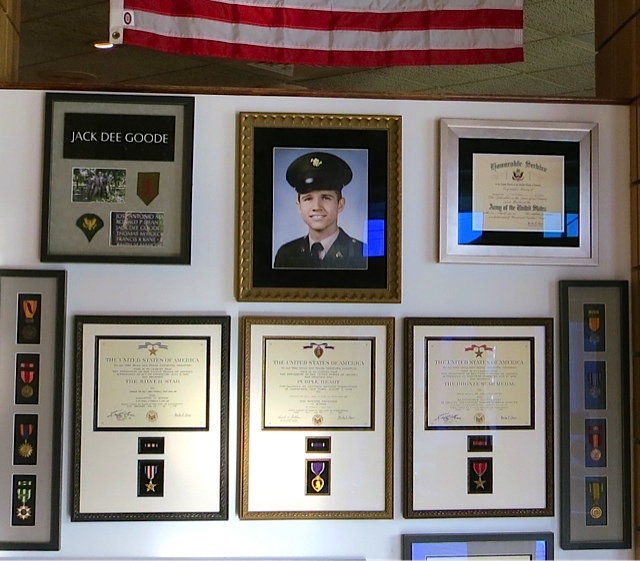
Jack Dee Goode is the ultimate example of being a good caretaker. Knowing his story will help your mission thrive.
The Uptown Café, Branson, Missouri, displays fifteen medals given to a hero, Jack Dee Goode. He is the ultimate example of a good caretaker. Jack was drafted in to the U.S. Army in 1967 and was deployed to Vietnam. In a battle, under fire, and wounded, Jack valiantly provided protection for his comrades. The direction of the President of the United States of America best describes his valor: “With complete disregard for his personal safety, specialist Goode began running through the hail of hostile rounds to a position from which he could better engage this part of the enemy force. As the concentrated fire struck all around him, he became wounded and forced to the ground. Completely ignoring his wounds, Specialist Goode dauntlessly crawled to the desired location and continued delivering the hostile force.” As a result, he died April 21, 1968. His medals were awarded posthumously.
Jack Dee Goode’s brother, David Goode is also the epitome of good caretaking. David Goode celebrates his brother’s legacy and that in turn inspires others. He also has another mission — to provide the public with good food and wholesome entertainment. He feeds the body and the soul. He humbly displays his brother’s story on the wall of his restaurant and contributes significantly to the well being of the community.
Every mission requires the heroism of caretaking – providing for the needs of others. If there is not a component of care taking and providing in your mission, there will not be a successful mission. Current trends suggest looking out only for “me”, for “I” or one’s own “ego”. However, if there is a successful mission in your future, you will also have to develop the skills of looking out for others.
So what is essential to thriving? Look at Jack and David Goode’s examples of good caretaking: being called, heeding the call, educating oneself to fulfilling the call, observing the job that needs to be done, and doing the job. There is no whining, discouragement, or circumventing of this call. There is only bravery and intelligent action.
If your mission loses strength or if you lose heart performing your mission, there is a tested and true answer to getting back strength and heart. The answer might not be to quit, but to take care of others. This lesson ends with a poem written by Elizabeth Charles. The poem was set to music and is frequently sung all over the world.
Is thy cruse of comfort failing?
Rise and share it with another,
And thro’ all the years of famine
It shall serve thee and thy brother;
Love divine will fill thy store-house,
Or thy handful still renew;
Scanty fare for one will often
Make a royal feast for two.
For the heart grows rich in giving;
All its wealth is living grain;
Seeds which mildew in the garner,
Scattered, fill with gold the plain.
Is thy burden hard and heavy?
Do thy steps drag wearily?
Help to bear thy brother’s burden,
God will bear both it and thee.
Numb and weary on the mountain,
Wouldst thou sleep amidst the snow?
Chafe that frozen form beside thee,
And together both shall glow.
Art thou stricken in life’s battle?
Many wounded round thee moan;
Lavish on their wounds thy balsams,
And that balm shall heal thine own.
Is the heart a well left empty?
None but God its void can fill;
Nothing but a ceaseless Fountain
Can its ceaseless longings still.
Is the heart a living power?
Self-entwined, its strength sinks low;
It can only live in loving,
And by serving love will grow.
By Elizabeth Charles (English Writer, January 2, 1828 – March 28, 1896)
Be a good caretaker. Provide for others. You will find that like the poem, your strength will successfully grow and in turn, so will your mission.
Quote
“Love seeketh not to please, nor for itself hath any care, but for another gives its ease and builds a Heaven in Hell's despair.
- William Blake, English Poet and Visual Artist
Activity
Activity: Caregiver 101
Materials: Paper and pen or pencil.
Time: Ten minutes to write and ten minutes for each person to discuss their responses.
Instruction:
1. Write down several opportunities you took to care or provide for others.
2. Choose one of these experiences and answer these questions: What did I do right? What did I do wrong? What did I learn this experience?
3. Discuss your answers with the group or with a family member or friend.
4. Allow each person in the group to tell you one thing they learned from your caregiving experience.
5. If you have time and want to do some problem solving, list a time you regretted choosing NOT to be a good caretaker. Answer the questions: Why did I refuse to provide for another or others? What did I learn from this experience? How would I act differently now?
6. List one mission you are on at this time. How will being a good caretaker help you progress on your present mission?
Affirmation
I am a good caretaker, so I can ...... We'd like to hear your story about being a good caretaker. Write your story below.
- « Previous lesson: Mature: I am responsible, accountable, and conscientious
- » Next lesson: Playful: Every day I do something fun